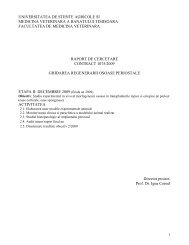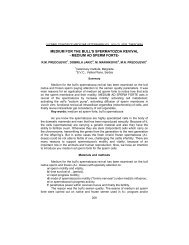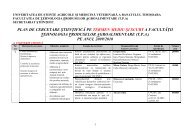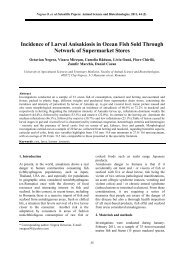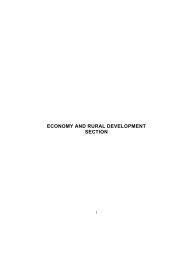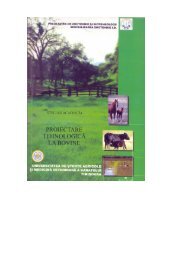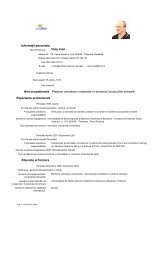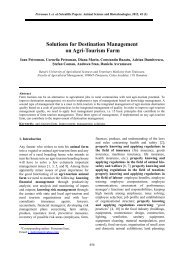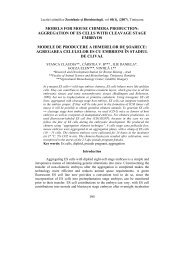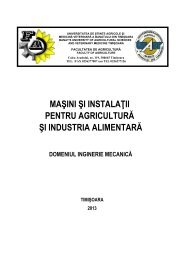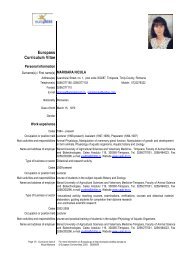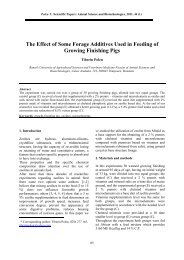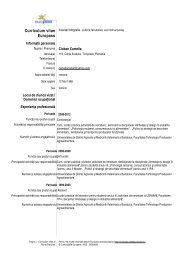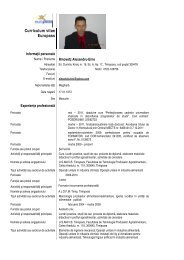journal of linguistic studies
journal of linguistic studies
journal of linguistic studies
You also want an ePaper? Increase the reach of your titles
YUMPU automatically turns print PDFs into web optimized ePapers that Google loves.
CONCLUSION<br />
The insufficient degree <strong>of</strong> orthographical adaptation <strong>of</strong> some borrowings can be<br />
noticed in the way these borrowings are spelled in Romanian newspapers and magazines;<br />
they are hyphenated when the definite article is added or when the plural form occurs:<br />
site-ul, toping-uri (Bursa,140, July 2005), lobby-ul, agreement-uri, site-uri (Ziarul<br />
financiar, 167, July 2005), know-how-ul, help-line-ul (Capital, 9, March 2006), browserul,<br />
mall-uri, firewall-ul (Săptămâna financiară, February 2006).<br />
Nevertheless, there are borrowings that Romanian has adapted to its orthographic<br />
system, such as: match vs. meci, speaker vs. spicher, goal vs. gol, finish vs. finiş, etc.<br />
Some English borrowings even display spelling variants in Romanian: break / brec, clovn<br />
/ claun, etc.<br />
Other borrowings that were assimilated from an orthographic point <strong>of</strong> view in the past<br />
are nowadays recorded in the dictionaries and used with their original, etymological<br />
spelling: jazz, challenger, etc.<br />
With regard to the spelling <strong>of</strong> the compound borrowings it has to be mentioned that<br />
the hyphen is widely used in Romanian, even when the original compound word is not<br />
hyphenated.<br />
REFERENCES<br />
Avram, Mioara. (1987). Gramatica pentru toţi. [Grammar for All]. Bucureşti: Editura<br />
Academiei.<br />
Avram, Mioara. (1990). Ortografie pentru toţi. [Orthography for All]. Bucureşti: Editura<br />
Academiei Române.<br />
Ciobanu, Georgeta. (2004). Adaptation <strong>of</strong> the English Element in Romanian. Timişoara:<br />
Editura Mirton.<br />
Dicţionarul explicative al limbii române. [A Comprehensive Dictionary <strong>of</strong> the Romanian<br />
Language]. (1998). Bucureşti: Editura Univers Enciclopedic.<br />
Dicţionar ortografic, ortoepic şi morfologic al limbii române. [An Orthographical,<br />
Orthoepic and Morphological Dictionary <strong>of</strong> the Romanian Language]. (2005).<br />
Bucureşti: Editura Univers Enciclopedic.<br />
Graur, A. (1995). Ortografia pentru toţi. [Orthography for All]. Bucureşti: Teora.<br />
Hristea, T. (1995). Ortografia şi ortoepia neologismelor româneşti.[Orthography and<br />
Orthoepy <strong>of</strong> Romanian Neologisms]. Limba şi literatura română 2.<br />
Lyutakova, R. (2004). Adaptarea ortografica a anglicismelor in limbile română şi bulgară.<br />
[Orthographical Adaptation <strong>of</strong> Anglicisms in Romanian and Bulgarian].<br />
Romanoslavica. Bucureşti: Editura Universităţii.<br />
Oxford Advanced Learner’s Dictionary. (1995). Oxford: Oxford University Press.<br />
Stoichitoiu-Ichim, A. (2001). Vocabularul limbii române actuale: dinamică, influenţe,<br />
creativitate. [The Vocabulary <strong>of</strong> Contemporary Romanian: Dynamics, Influences,<br />
Creativity]. Bucureşti: Editura All.<br />
Vasiliu, E. (1979). Scrierea limbii române în raport cu fonetica şi fonologia. [The<br />
Writing <strong>of</strong> Romanian in Relation to Phonetics and Phonology]. Bucureşti: Tipografia<br />
Universităţii Bucureşti.<br />
ANDREEA VARGA<br />
119, Calea Aradului<br />
Timisoara – 300645, Romania<br />
34



